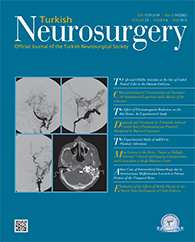2Recep Tayyip Erdogan University, Faculty of Medicine, ENT, Rize, Turkey
3Antalya Numune Research and Education Hospital, Department of Neurosurgery, Antalya, Turkey
4Ankara Numune Research and Education Hospital, ENT, Ankara, Turkey DOI : 10.5137/1019-5149.JTN.7750-12.0 AIM: Postoperative cerebrospinal fluid (CSF) leak following endoscopic endonasal transsphenoidal surgery (EETS) is associated with increased morbidity and mortality. This prospective study is the first evaluation of using autologous fibrin sealant for preventing postoperative CSF leak and related complications.
MATERIAL and METHODS: 200 endoscopic endonasal transsphenoidal approaches were included in the study and reviewed retrospectively from September 2010 to June 2012. A total of 55 patients who have large skull base and diafragma sella defects, connected with basal cisterns or ventricles, were chosen for the study. The patients were operated via extended or classical endoscopic endonasal transsphenoidal approach. The skull base has been repaired using AFS combined with multilayer reconstruction in all cases. The incidence of CSF leak as a complication of EETS was analyzed.
RESULTS: The ages of the patients ranged from 20 to 83 years (mean 49.3 years). There were 25 (46%) male patients and 30 (54%) females. All patients had tumors with suprasellar or parasellar extension. Postoperative CSF leak was determined in 2 patients (3.6%). There were no complications and allergic reactions associated with the use of AFS.
CONCLUSION: Using of AFS combined with multilayer reconstruction technique is a safe and effective method to prevent CSF leak in large defects following EETS.
Keywords : Endoscopic endonasal transsphenoidal, Cerebrospinal fluid leak, Autologous fibrin sealant, Skull base reconstruction




